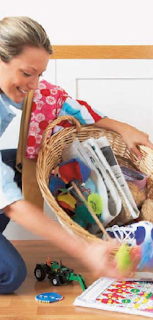Learning basic skills—how to declutter, how to clean—is only the first step on the road to better home management. To reach the goal of a clean and organized home, we must craft our own personal home management habits and routines.
Any method we select must work with our unique personality, lifestyle, and strengths.
In home management, as with pantyhose, there is no such thing as “one size fits all.” One person’s list-based
routine seems scattered and annoying to someone who prefers the tighter structure of a daily planner. Your neighbor swears by the scheduling advice she found online, but the tight blocks of time in her day don’t work with your more casual approach.
Your sister thinks it’s essential to have all counters and surfaces bare of distractions; you can’t work well unless you can see your tools and supplies.
Get personal
Knowledge is power—but self-knowledge is empowerment.
Moving from disorder and chaos to effective, orderly living requires more than simple information or one person’s “There is only one right way to get organized: yours.” example; it requires personally devised solutions that will work for you as an individual—not for your sister or your neighbor or anyone else.
Throughout this book, we’ll help you tailor advice and recommendations to suit your own personality and family lifestyle. We’ll identify your “clutter personality”—the habits and thinking that have caused you to become a clutterer Instead of establishing one level of “clean”, we’ll help you assess your own family’s needs and constraints, so you can reach the right state of “clean enough” for your home.
Where do I start?
It’s easy to pick up a book about home management, read along, laugh at the jokes, and put the book down again.
Translating that experience into a cleaner, more organized home is another matter.
If you find yourself looking around your disorganized home and thinking: “Where do I start?” the simple answer is: you start where you are, then take a single step.
Getting organized isn’t a race—it’s a journey. On a journey, what matters is the trip, not where you start or how fast you make it, or where other people are along the way.
Too often, folks frustrated by the condition of their homes see getting organized as a hundred-yard dash: an activity with a beginning and an end and a lot of heated pounding in between. “I will clean things up,” they vow, “and this time, it’s going to stay that way!” A week later, they have little to show for all the effort, because they haven’t effected the real change that will solve the problems of disorder and chaos.
To make that change, take a single step toward better organization, right where you are. Tomorrow, take another step toward better home life. And another. And another. Just as chaos and disorder didn’t spring full-blown into your home in a single day, so it won’t be conquered in one day, either.
The important thing is to take the first step, make the first change—and just keep traveling.
Start small. Developing good habits, like clearing up clutter that has accumulated at the end of each day, provides easy-to-see results that will help to keep you motivated.
Find fellow travelers
Anyone who’s taken a walk with friends knows that sharing and friendship make even the roughest climb easier. It’s no different in your journey to better home management. Look for like minds to walk with you and lighten the way.
There are a number of places where you might find potential fellow travelers. In your community, be alert for
friends or neighbors who might form a support network for your get-organized efforts. Seek out a “declutter buddy”: a friend who brings a detached view to decluttering sessions.
Without the ties that bind, she’ll help you see your stuff in “The important thing is to take the first step—and just keep traveling.”
a new light and help you release it; next week, it’s your turn to help her clear out the closet. Check with church groups, clubs, or parents’ associations to find other folks with whom to share your progress; their support will make all the difference and will help to keep you motivated and enthusiastic.
Dedicated support groups can be a wonderful source of accountability and motivation. In North America, Clutterers Anonymous (CLA) applies the Twelve Step program first modeled by Alcoholics Anonymous to issues of clutter and hoarding.
Other clutter recovery support groups are offered by counseling centers or volunteer organizations. Community education services or church groups may offer classes and workshops on home management.


Enregistrer un commentaire